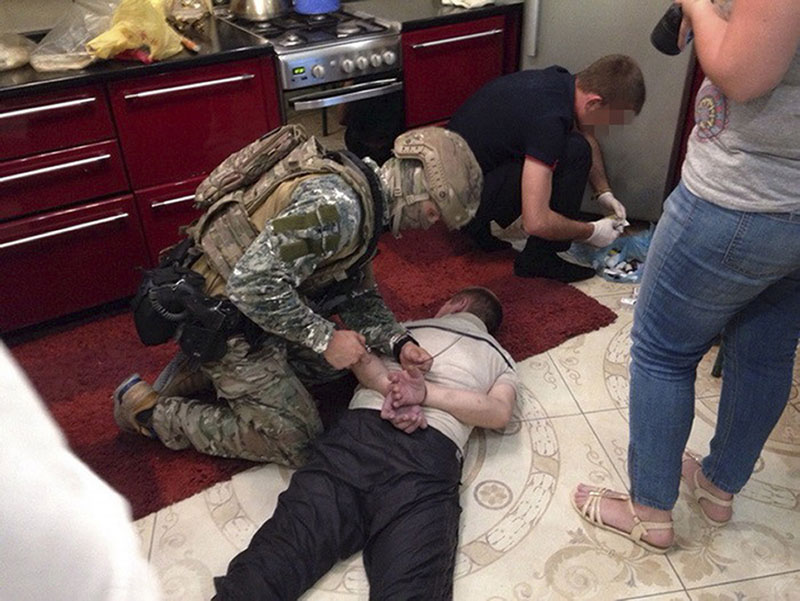War turns Ukraine into 'supermarket' for illegal weapons
The war in eastern Ukraine against Russia-backed separatists has led to the uncontrolled spread of firearms throughout the country, with experts describing Ukraine as a "supermarket" where millions of illegal weapons are for sale.
Since the armed conflict broke out in 2014, the number of crimes involving firearms has more than doubled in Ukraine, a country where gun ownership was previously very rare. Some of the weapons are also being smuggled out of the country, destined for conflict zones in the Middle East or for Europe, adding to fears of more attacks.
Andriy, the arms dealer, fought with the nationalist Right Sector volunteer battalion for more than a year against the separatists. He agreed to discuss the illegal weapons trade on the condition he be identified only by his first name for fear of being arrested. If convicted of illegal weapons sales, he could be sent to prison for five years.
With the worst of the fighting in eastern Ukraine now over, Andriy said a used handgun can be purchased there for as little as $20. "But from the east, the road is long and dangerous," he said, explaining the significant markup he gets in the capital, Kiev.
Some of the weapons sold illegally were seized from separatist fighters and are believed to have been supplied by Russia. In June, Ukraine's security services seized more than 200 rocket launchers, 3,000 grenades and two Shmel flamethrowers that are not part of the Ukrainian arsenal.
But most of the weapons on the black market come from the Ukrainian military and the around 40 volunteer battalions, which for most of the fighting remains outside the military chain of command.
Nadiya Savchenko, a Ukrainian military pilot who fought with a volunteer battalion, blames corrupt military leaders for the flourishing black market.
Savchenko, who became a national hero after being captured and jailed in Russia for two years, alleges that weapons that should have been given to Ukrainian soldiers who were called up to fight have ended up on the black market instead.
"I remember how it all began: The guys were mobilized but not given automatic rifles," she told The Associated Press. "(But) they understood that an automatic rifle is the only thing that can protect their life. And then automatic rifles became worth their weight in gold. They bought them and hid them."
Dmytro, a Ukrainian soldier speaking on condition of anonymity for fear of criminal charges, said when he was called up in 2014 he received nothing but food. "Everyone who was mobilized brought home at least two or three guns," he said. "For my family it was like hard currency." He has since signed a military contract and now receives a monthly salary of $320.
Over the past two years, about 250,000 Ukrainians were called up in six mobilization waves.
Since the armed conflict began in April 2014, at least 9,500 people have been killed. A cease-fire agreement signed in 2015 greatly reduced the fighting, but this summer has seen an uptick in casualties. International monitors have accused both sides of violating the cease-fire by using heavy weaponry that was supposed to have been withdrawn.
Government efforts to persuade people to voluntarily surrender their weapons have had limited success. An appeal by the national police force in March yielded 4,500 firearms, more than 300 shells, about 250 grenades and even a grenade launcher.
Police Col. Kostyantyn Zhuk said the result was extremely disappointing. "This is just a drop in the ocean," he said.
In 2015, there were 1,526 crimes involving firearms, up from 784 in 2013. The difference is even starker considering the 2015 figures do not include the conflict zones in the east or Crimea, which Russia annexed in 2014. Police said 70 percent of the weapons used in the crimes had come from eastern Ukraine.
The other concern is smuggling, with the main route running west through European Union countries Hungary, Poland, Romania and Slovakia, all of which share a border with Ukraine.
The Ukrainian border guards say they thwart several smuggling attempts every month. In June, a German citizen was detained while trying to cross into Romania with a firearm and ammunition. On the border with Slovakia, a Ukrainian guard who discovered weapons was shot and wounded by the smugglers, who then fled.
Uchaikin, of the gun owners' association, said the arms are smuggled into Europe along the same routes long used to smuggle cigarettes. He accused the border guards of profiting from the trade and allowing vehicles to pass through without inspection.
The Ukrainian Security Service denied this. In announcing the arrest of the Frenchman, the security service said its agents had been tracking him for months and allowed him to buy five Kalashnikovs, two rocket-propelled grenade launchers, 125 kilograms (275 pounds) of explosives, 100 detonators and other arms.
The man was planning a series of terror attacks in France before and during this summer's European soccer championship, the security service said.






